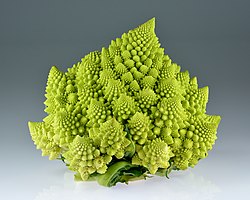Romanesco broccoli
Vegetable, member of the cabbage family From Wikipedia, the free encyclopedia
Romanesco broccoli (also known as broccolo romanesco, romanesque cauliflower, or simply romanesco) is in fact a cultivar of the cauliflower (Brassica oleracea var. botrytis), not broccoli (Brassica oleracea var. italica).[1] It is one of two types of broccoflower. It is an edible flower bud of the species Brassica oleracea, which also includes regular broccoli and cauliflower. It is chartreuse in color and has a striking form that naturally approximates a fractal.[2] Romanesco has a nutty flavor and a firmer texture than white cauliflower or broccoli when cooked.[3][4]
| Romanesco | |
|---|---|
 Romanesco, showing its self-similar form | |
| Species | Brassica oleracea |
| Cultivar group | Botrytis cultivar group |
Description
Summarize
Perspective



Romanesco superficially resembles a cauliflower, but it is chartreuse in color, with the form of a natural fractal. Nutritionally, romanesco is rich in vitamin C, vitamin K, dietary fiber, and carotenoids.[5]
Fractal structure
The inflorescence (the bud) is self-similar in character, with the branched meristems making up a logarithmic spiral, giving a form approximating a natural fractal; each bud is composed of a series of smaller buds, all arranged in yet another logarithmic spiral. This self-similar pattern continues at smaller levels. The pattern is only an approximate fractal since the pattern eventually terminates when the feature size becomes sufficiently small. The number of spirals on the head of Romanesco broccoli is a Fibonacci number.[6]
The causes of its differences in appearance from the normal cauliflower and broccoli have been modeled as an extension of the preinfloresence stage of bud growth.[7] A 2021 paper has ascribed this phenomenon to perturbations of floral gene networks that causes the development of meristems into flowers to fail, but instead to repeat itself in a self-similar way.[8][9]
See also
References
External links
Wikiwand - on
Seamless Wikipedia browsing. On steroids.
